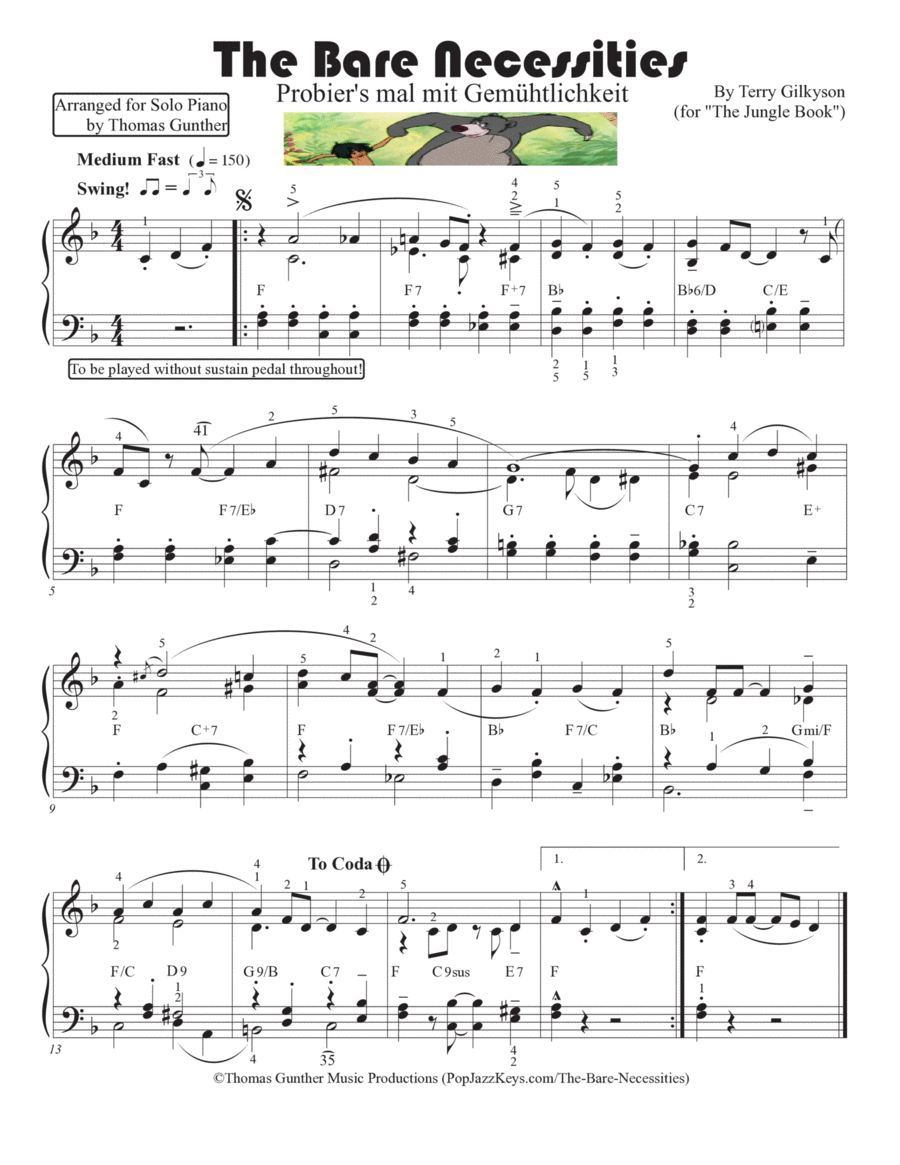Piano Solo - Level 2 - Digital Download SKU: A0.1277927 Composed by Terry Gilkyson. Arranged by Thomas Gunther. Comedy,Film/TV,Jazz. Score. 2 pages. Thomas Gunther Music Productions #869433. Published by Thomas Gunther Music Productions (A0.1277927). About the arrangement(See also (PopJazzKeys.com/The-Bare-Necessities)This is a relatively easy to play solo piano jazz arrangement of THE BAR NECESSITIES. The song is a traditional jazz tune made famous in the Walt Disney movie THE JUNGLE BOOK. The video and audio recording I posted here features me playing the short version of my arrangement. When played as written (with all the repeats) it is almost 4 minutes long.What's cool about this arrangement is that you can easily add a bass player and even an entire rhythm section while playing it the same way as you would in a solo performance!Who this arrangement is best suited forI think everyone who likes the song except perhaps advanced jazz pianists will have fun learning and playing this arrangement. I arranged this piece originally with my younger piano students in mind, who have smaller hands than most adults. Thatâs why there are no large intervals or big jumps in the left hand. Something generally found in ragtime and early jazz piano styles. This means that my arrangement is perfectly suited for pianists with smaller hands. Of course pianists with large hands (like myself) can play it too (ha-ha!).I think it is also a great piece for pianists who want to familiarize themselves with playing jazz piano. And since I wrote out every note and articulation, they can play along with the recording and hopefully pick up the traditional jazz feel along the way.Although the arrangement is not very difficult, it poses several challenges for the inexperienced pianist, as explained later.How I arranged itAs I already explained above, there are no large intervals or big jumps in the left hand to be found. Instead, I focused more on polyphonic arranging techniques, in both hands. I also used guide tones and inversions.The left hand imitates the accompaniment style of a traditional jazz guitar or banjo player with added half time bass figures that are typically played by a tuba or upright bass an octave lower. Tips for how to learn this arrangementWhen I teach this song to my students I strongly recommend to them to listen to the original version and my recording a lot, rather than explaining to them how swinging eighth notes and jazz articulation work. By the way, there are a few bars where you hear me playing straight eighths on the recording (as indicated in the sheet music). I decided to add articulations so that pianists who have not a lot of experience with playing jazz will find it easier to play it with the appropriate âtouchâ. It's a good idea to check those out.Should you not be familiar with playing polyphonic passages with one hand, you might want to practice very slowly at first and attempt to balance the different voices appropriately. Listening to the recording will also help with discovering dynamic possibilities. I didnât want to clutter up the sheet music with dynamic markings, so listening to the recording is really the only way to figure out what dynamics I had in mind.
